Nursing Reflection: Self-Assessment of Nursing Career Preparation
VerifiedAdded on 2020/03/13
|5
|1116
|53
Journal and Reflective Writing
AI Summary
This assignment is a self-reflective paper by a nursing student, detailing their experiences and learning throughout their training. The student uses the 5 R's of Reflection (Reporting, Responding, Relating, Reasoning, and Reconstructing) to analyze their growth. The paper recounts specific incidents, such as a near-miss with a GBS patient and experiences in emergency and critical care settings. The student highlights the importance of patient safety, time management, handling patient families, and developing skills in emergency situations like cardiac arrest. The reflection also identifies areas for future improvement, including enhancing time management, developing specialized skills, and improving leadership capabilities. The paper references several academic sources to support the reflections. This assignment offers valuable insights into the practical challenges and professional development of a nursing student.
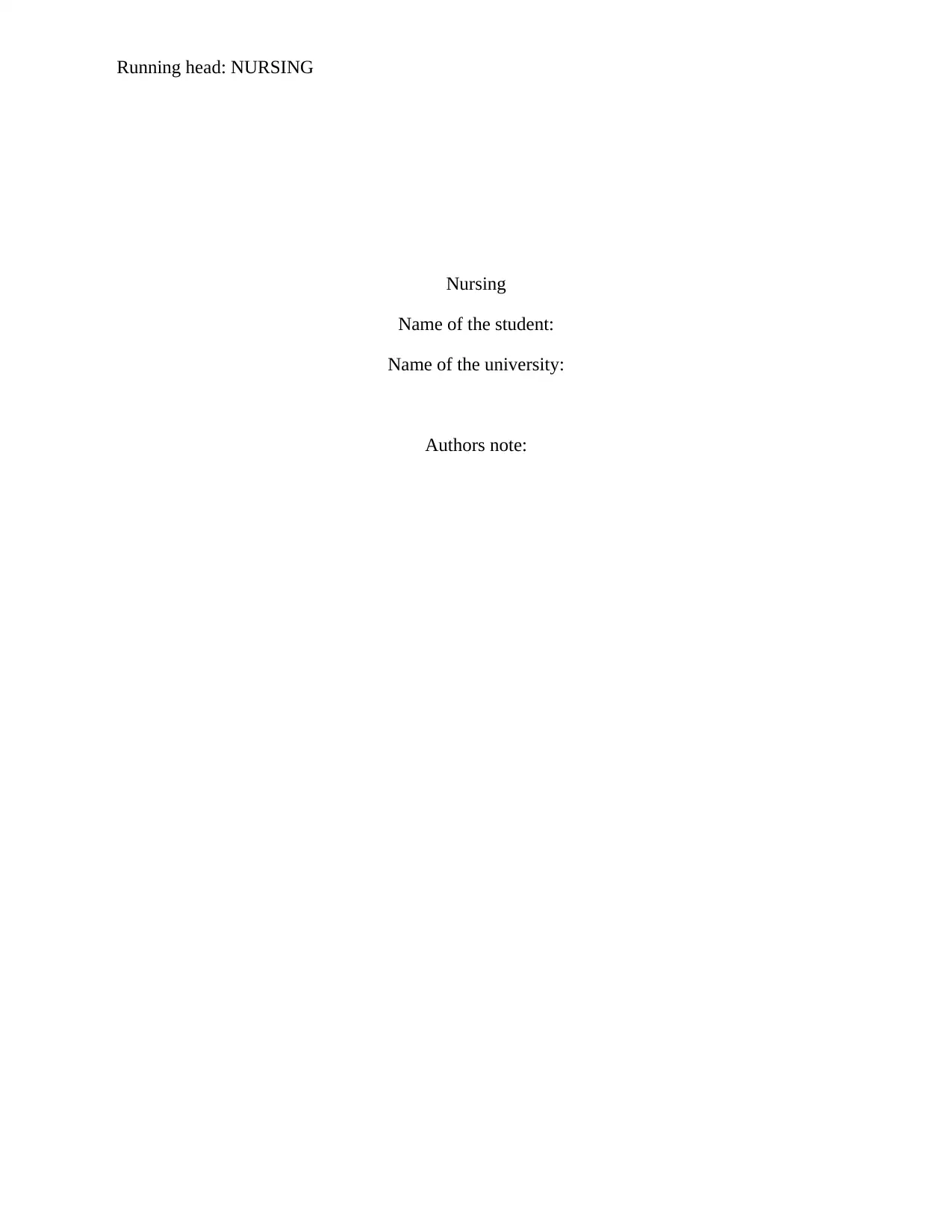
Running head: NURSING
Nursing
Name of the student:
Name of the university:
Authors note:
Nursing
Name of the student:
Name of the university:
Authors note:
Paraphrase This Document
Need a fresh take? Get an instant paraphrase of this document with our AI Paraphraser
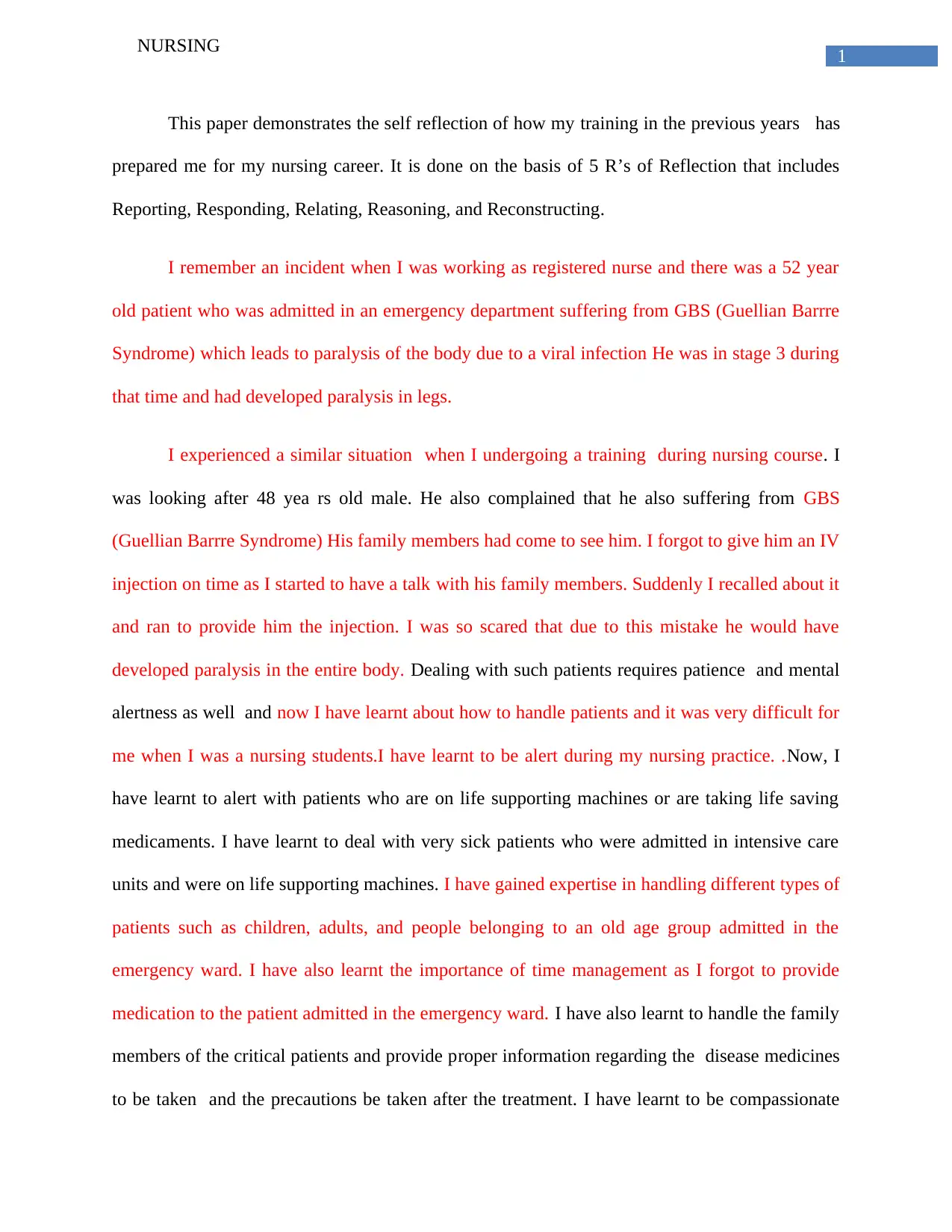
1
NURSING
This paper demonstrates the self reflection of how my training in the previous years has
prepared me for my nursing career. It is done on the basis of 5 R’s of Reflection that includes
Reporting, Responding, Relating, Reasoning, and Reconstructing.
I remember an incident when I was working as registered nurse and there was a 52 year
old patient who was admitted in an emergency department suffering from GBS (Guellian Barrre
Syndrome) which leads to paralysis of the body due to a viral infection He was in stage 3 during
that time and had developed paralysis in legs.
I experienced a similar situation when I undergoing a training during nursing course. I
was looking after 48 yea rs old male. He also complained that he also suffering from GBS
(Guellian Barrre Syndrome) His family members had come to see him. I forgot to give him an IV
injection on time as I started to have a talk with his family members. Suddenly I recalled about it
and ran to provide him the injection. I was so scared that due to this mistake he would have
developed paralysis in the entire body. Dealing with such patients requires patience and mental
alertness as well and now I have learnt about how to handle patients and it was very difficult for
me when I was a nursing students.I have learnt to be alert during my nursing practice. .Now, I
have learnt to alert with patients who are on life supporting machines or are taking life saving
medicaments. I have learnt to deal with very sick patients who were admitted in intensive care
units and were on life supporting machines. I have gained expertise in handling different types of
patients such as children, adults, and people belonging to an old age group admitted in the
emergency ward. I have also learnt the importance of time management as I forgot to provide
medication to the patient admitted in the emergency ward. I have also learnt to handle the family
members of the critical patients and provide proper information regarding the disease medicines
to be taken and the precautions be taken after the treatment. I have learnt to be compassionate
NURSING
This paper demonstrates the self reflection of how my training in the previous years has
prepared me for my nursing career. It is done on the basis of 5 R’s of Reflection that includes
Reporting, Responding, Relating, Reasoning, and Reconstructing.
I remember an incident when I was working as registered nurse and there was a 52 year
old patient who was admitted in an emergency department suffering from GBS (Guellian Barrre
Syndrome) which leads to paralysis of the body due to a viral infection He was in stage 3 during
that time and had developed paralysis in legs.
I experienced a similar situation when I undergoing a training during nursing course. I
was looking after 48 yea rs old male. He also complained that he also suffering from GBS
(Guellian Barrre Syndrome) His family members had come to see him. I forgot to give him an IV
injection on time as I started to have a talk with his family members. Suddenly I recalled about it
and ran to provide him the injection. I was so scared that due to this mistake he would have
developed paralysis in the entire body. Dealing with such patients requires patience and mental
alertness as well and now I have learnt about how to handle patients and it was very difficult for
me when I was a nursing students.I have learnt to be alert during my nursing practice. .Now, I
have learnt to alert with patients who are on life supporting machines or are taking life saving
medicaments. I have learnt to deal with very sick patients who were admitted in intensive care
units and were on life supporting machines. I have gained expertise in handling different types of
patients such as children, adults, and people belonging to an old age group admitted in the
emergency ward. I have also learnt the importance of time management as I forgot to provide
medication to the patient admitted in the emergency ward. I have also learnt to handle the family
members of the critical patients and provide proper information regarding the disease medicines
to be taken and the precautions be taken after the treatment. I have learnt to be compassionate
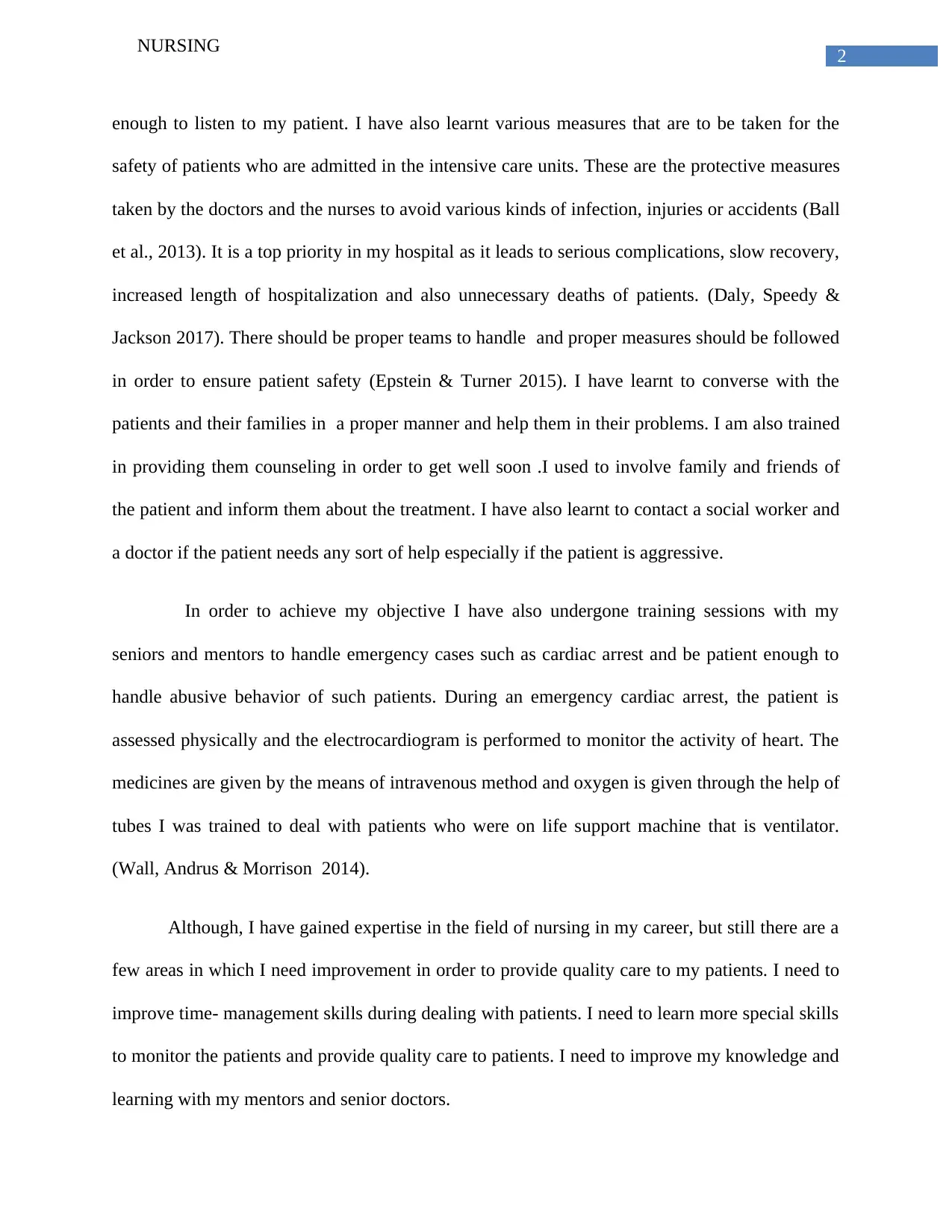
2
NURSING
enough to listen to my patient. I have also learnt various measures that are to be taken for the
safety of patients who are admitted in the intensive care units. These are the protective measures
taken by the doctors and the nurses to avoid various kinds of infection, injuries or accidents (Ball
et al., 2013). It is a top priority in my hospital as it leads to serious complications, slow recovery,
increased length of hospitalization and also unnecessary deaths of patients. (Daly, Speedy &
Jackson 2017). There should be proper teams to handle and proper measures should be followed
in order to ensure patient safety (Epstein & Turner 2015). I have learnt to converse with the
patients and their families in a proper manner and help them in their problems. I am also trained
in providing them counseling in order to get well soon .I used to involve family and friends of
the patient and inform them about the treatment. I have also learnt to contact a social worker and
a doctor if the patient needs any sort of help especially if the patient is aggressive.
In order to achieve my objective I have also undergone training sessions with my
seniors and mentors to handle emergency cases such as cardiac arrest and be patient enough to
handle abusive behavior of such patients. During an emergency cardiac arrest, the patient is
assessed physically and the electrocardiogram is performed to monitor the activity of heart. The
medicines are given by the means of intravenous method and oxygen is given through the help of
tubes I was trained to deal with patients who were on life support machine that is ventilator.
(Wall, Andrus & Morrison 2014).
Although, I have gained expertise in the field of nursing in my career, but still there are a
few areas in which I need improvement in order to provide quality care to my patients. I need to
improve time- management skills during dealing with patients. I need to learn more special skills
to monitor the patients and provide quality care to patients. I need to improve my knowledge and
learning with my mentors and senior doctors.
NURSING
enough to listen to my patient. I have also learnt various measures that are to be taken for the
safety of patients who are admitted in the intensive care units. These are the protective measures
taken by the doctors and the nurses to avoid various kinds of infection, injuries or accidents (Ball
et al., 2013). It is a top priority in my hospital as it leads to serious complications, slow recovery,
increased length of hospitalization and also unnecessary deaths of patients. (Daly, Speedy &
Jackson 2017). There should be proper teams to handle and proper measures should be followed
in order to ensure patient safety (Epstein & Turner 2015). I have learnt to converse with the
patients and their families in a proper manner and help them in their problems. I am also trained
in providing them counseling in order to get well soon .I used to involve family and friends of
the patient and inform them about the treatment. I have also learnt to contact a social worker and
a doctor if the patient needs any sort of help especially if the patient is aggressive.
In order to achieve my objective I have also undergone training sessions with my
seniors and mentors to handle emergency cases such as cardiac arrest and be patient enough to
handle abusive behavior of such patients. During an emergency cardiac arrest, the patient is
assessed physically and the electrocardiogram is performed to monitor the activity of heart. The
medicines are given by the means of intravenous method and oxygen is given through the help of
tubes I was trained to deal with patients who were on life support machine that is ventilator.
(Wall, Andrus & Morrison 2014).
Although, I have gained expertise in the field of nursing in my career, but still there are a
few areas in which I need improvement in order to provide quality care to my patients. I need to
improve time- management skills during dealing with patients. I need to learn more special skills
to monitor the patients and provide quality care to patients. I need to improve my knowledge and
learning with my mentors and senior doctors.
⊘ This is a preview!⊘
Do you want full access?
Subscribe today to unlock all pages.

Trusted by 1+ million students worldwide
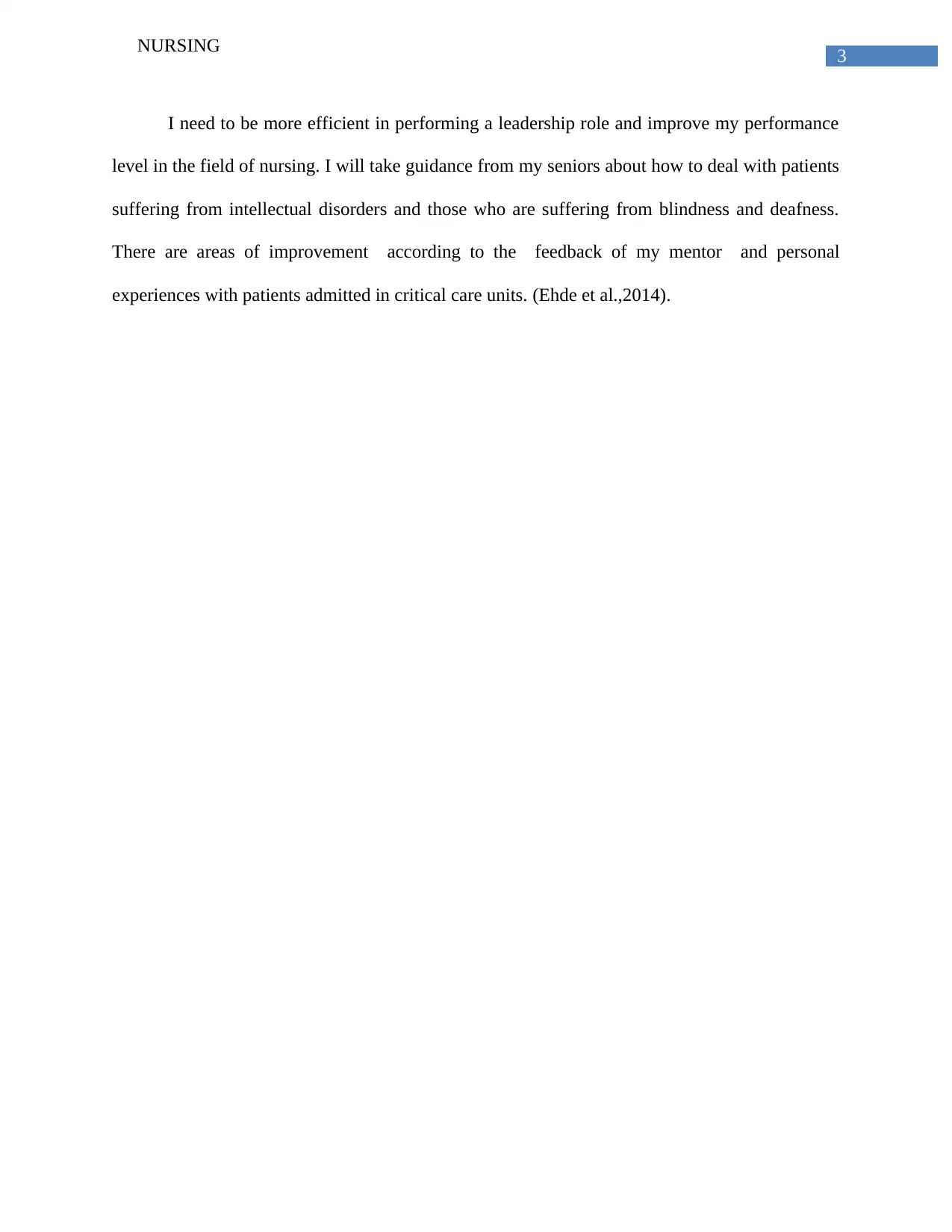
3
NURSING
I need to be more efficient in performing a leadership role and improve my performance
level in the field of nursing. I will take guidance from my seniors about how to deal with patients
suffering from intellectual disorders and those who are suffering from blindness and deafness.
There are areas of improvement according to the feedback of my mentor and personal
experiences with patients admitted in critical care units. (Ehde et al.,2014).
NURSING
I need to be more efficient in performing a leadership role and improve my performance
level in the field of nursing. I will take guidance from my seniors about how to deal with patients
suffering from intellectual disorders and those who are suffering from blindness and deafness.
There are areas of improvement according to the feedback of my mentor and personal
experiences with patients admitted in critical care units. (Ehde et al.,2014).
Paraphrase This Document
Need a fresh take? Get an instant paraphrase of this document with our AI Paraphraser
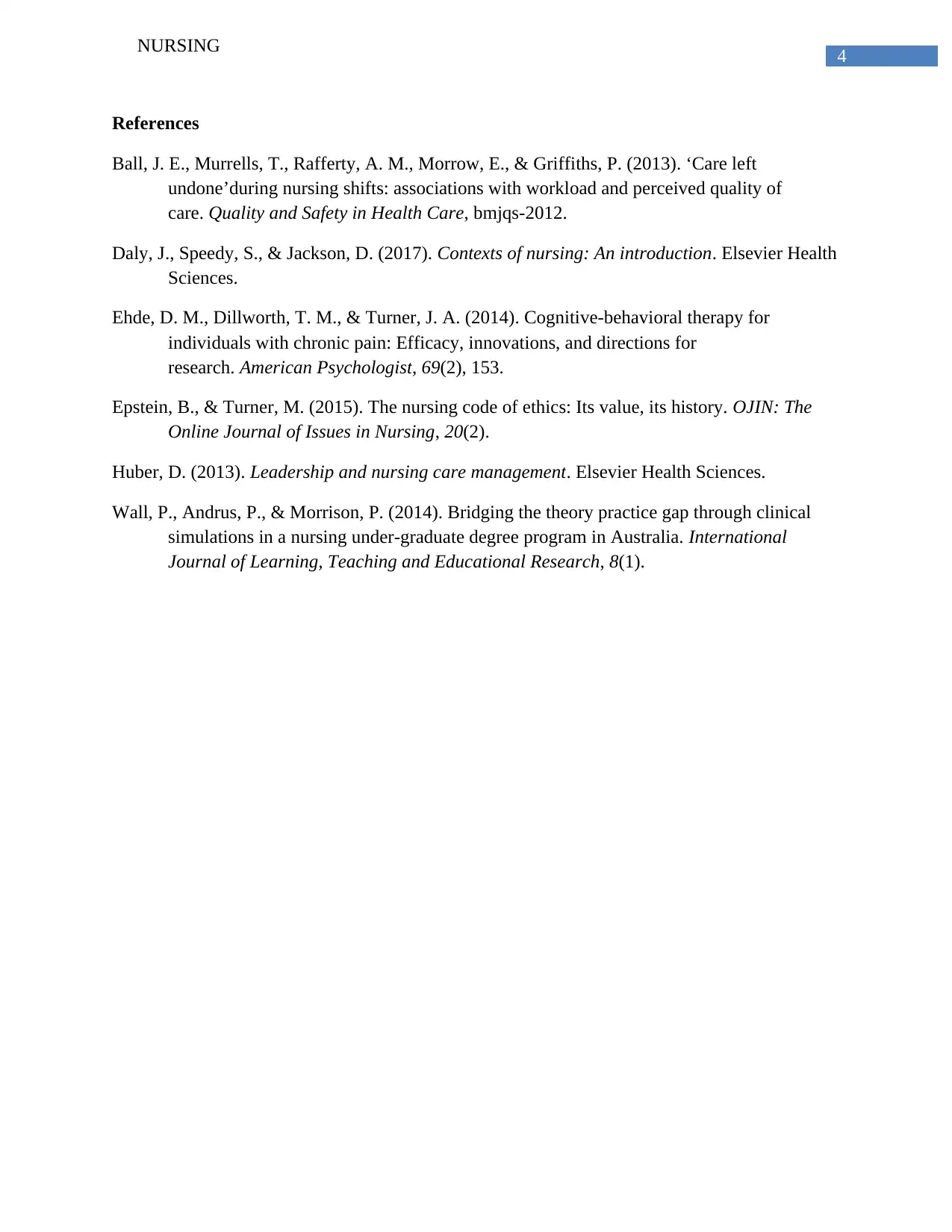
4
NURSING
References
Ball, J. E., Murrells, T., Rafferty, A. M., Morrow, E., & Griffiths, P. (2013). ‘Care left
undone’during nursing shifts: associations with workload and perceived quality of
care. Quality and Safety in Health Care, bmjqs-2012.
Daly, J., Speedy, S., & Jackson, D. (2017). Contexts of nursing: An introduction. Elsevier Health
Sciences.
Ehde, D. M., Dillworth, T. M., & Turner, J. A. (2014). Cognitive-behavioral therapy for
individuals with chronic pain: Efficacy, innovations, and directions for
research. American Psychologist, 69(2), 153.
Epstein, B., & Turner, M. (2015). The nursing code of ethics: Its value, its history. OJIN: The
Online Journal of Issues in Nursing, 20(2).
Huber, D. (2013). Leadership and nursing care management. Elsevier Health Sciences.
Wall, P., Andrus, P., & Morrison, P. (2014). Bridging the theory practice gap through clinical
simulations in a nursing under-graduate degree program in Australia. International
Journal of Learning, Teaching and Educational Research, 8(1).
NURSING
References
Ball, J. E., Murrells, T., Rafferty, A. M., Morrow, E., & Griffiths, P. (2013). ‘Care left
undone’during nursing shifts: associations with workload and perceived quality of
care. Quality and Safety in Health Care, bmjqs-2012.
Daly, J., Speedy, S., & Jackson, D. (2017). Contexts of nursing: An introduction. Elsevier Health
Sciences.
Ehde, D. M., Dillworth, T. M., & Turner, J. A. (2014). Cognitive-behavioral therapy for
individuals with chronic pain: Efficacy, innovations, and directions for
research. American Psychologist, 69(2), 153.
Epstein, B., & Turner, M. (2015). The nursing code of ethics: Its value, its history. OJIN: The
Online Journal of Issues in Nursing, 20(2).
Huber, D. (2013). Leadership and nursing care management. Elsevier Health Sciences.
Wall, P., Andrus, P., & Morrison, P. (2014). Bridging the theory practice gap through clinical
simulations in a nursing under-graduate degree program in Australia. International
Journal of Learning, Teaching and Educational Research, 8(1).
1 out of 5
Related Documents
Your All-in-One AI-Powered Toolkit for Academic Success.
+13062052269
info@desklib.com
Available 24*7 on WhatsApp / Email
![[object Object]](/_next/static/media/star-bottom.7253800d.svg)
Unlock your academic potential
Copyright © 2020–2026 A2Z Services. All Rights Reserved. Developed and managed by ZUCOL.





